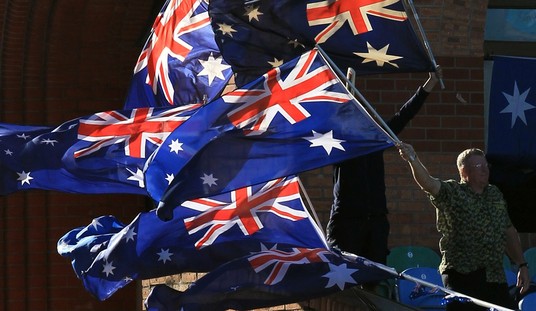The Times Online says the administration is now pressing Islamabad to fight after its disastrous peace agreement with the Taliban in the NWFP inaugurated a pell-mell retreat. Secretary of State Clinton and senior diplomat Richard Holbrooke urged Pakistan not to abdicate to the Islamic extremists as they moved closer to the capital itself. Meanwhile, Bill Roggio, who has been warning against the peace deal with the Taliban from the beginning, notes that Pakistani Rangers have been deployed on the outskirts of Islamabad.
Hillary Clinton, the US Secretary of State, accused Pakistan this week of “abdicating to the Taleban”, which “poses a mortal threat to the security and safety of our country and the world”. … Mrs Clinton’s remarks followed a recent deal between Mr Zardari and the Taleban in the Swat Valley, allowing them to establish a fundamentalist enclave in the former tourist area in exchange for laying down their arms.
The Taleban have not disarmed, and this week its fighters poured out of Swat into the neighbouring district of Buner, taking control of government buildings and digging in at strategic positions around the major towns.
However, the administration itself has been talking about negotiating with the moderate Taliban for some time. Carlotta Gall, writing in the New York Times, said last month that preliminary talks had already begun. “Even as President Obama floated the idea of negotiating with moderate elements of the Taliban, Afghan and foreign officials here said that preliminary discussions with the Taliban leadership were already under way and could be developed into more formal talks with the support of the United States.” While it is difficult to equate the Pakistani agreement with any that Washington is contemplating, the Pakistani experience underscores how badly wrong ‘peace deals’ can go.
Bill Roggio says that military sources are astounded at the speed with which Pakistani resistance has collapsed. Some of his sources suggested that Pakistan lost an opportunity to defeat the Taliban and by turning to a policy of appeasement snatched defeat from the jaws of victory. While things could still be turned around, it meant the road back would be longer and harder than ever.
A senior intelligence official said the lack of response by the Pakistani government and military ensures a bloody fight. “The longer the state has deferred taking the Taliban head on, the stronger the Taliban has gotten,” the official said. “Any attempt to put the Taliban genie back in the bottle will result a major bloodbath. Assuming the Pakistanis make an effort to defend themselves, that is.”
The rout began with an ill-conceived peace agreement with the Taliban. The collapse of the Pakistani efforts to contain them unfolded with shocking speed. Roggio writes:
US military and intelligence officials have expressed horror at the speed of the Taliban advance and the lack of a strong response from the Pakistani government and military. The officials spoke on condition of anonymity because the sensitivity of the issue. … “The Pakistani Army is sitting on the sidelines as the Taliban march all the way to Islamabad’s back door,” one intelligence official said. “Why is the government putting inferior troops in the path of the Taliban, only to watch them get chewed up and spit out. Where is the Army? The Army is purposefully sitting on the sidelines, either demoralized by losses or unwilling to fight, while Pakistan is burning.”
A military officer said the Pakistani government missed its window of opportunity to contain the Taliban. “The time to stop this madness was five years ago, in Waziristan,” the officer said. “Instead, the government caved to the Taliban in North and South Waziristan, and this only emboldened them to conquer more and more territory. Now the Taliban is within reach of the capital, yet the government still seems to have no grasp on the threat.”
There may have been a major miscalculation, whose consequences are now creating grave concern in Washington. The Times Online used the “nuclear” word in its lede and added: “The US considers rooting out militant sanctuaries in Pakistan critical to success in the Afghan war. Washington is also worried about the security of Pakistan’s nuclear weapons.”
From handshakes to worries about nukes. From “peace in our time” to the Battle of Britain. Once the overall design margin of a system has been eroded, failure when it comes manifests itself in a rapid cascade of events. The hidden stresses suddenly pile on each other and the structure, raddled with hundreds of weaknesses each minor in itself, collapses under their simultaneous impact. Today the United States is under threat on a number of fronts, from the Black Sea to cyberspace and South Asia. Since November 2008 America’s response to those challenges has been informed by a new set of assumptions about the nature of the world and the appropriate response to them. Now those assumptions will be put to the test. More than ever the United States needs good intelligence: about Pakistani intentions, the security of that country’s nukes, Taliban capability and foreign support against US troops. More than ever the public needs to know whether the world view of the new administration is part of the solution or part of the problem. Like the Islamabad, Washington will eventually find out.









Join the conversation as a VIP Member